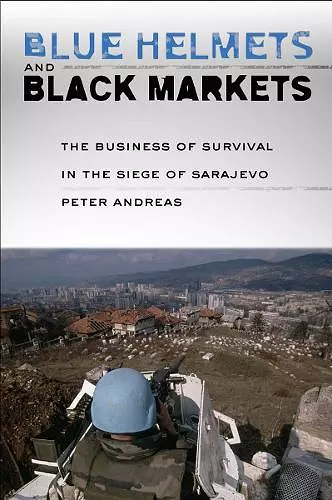Blue Helmets and Black Markets
The Business of Survival in the Siege of Sarajevo
Format:Paperback
Publisher:Cornell University Press
Published:6th Apr '16
Currently unavailable, and unfortunately no date known when it will be back

The 1992–1995 battle for Sarajevo was the longest siege in modern history. It was also the most internationalized, attracting a vast contingent of aid workers, UN soldiers, journalists, smugglers, and embargo-busters. The city took center stage under an intense global media spotlight, becoming the most visible face of post-Cold War conflict and humanitarian intervention. However, some critical activities took place backstage, away from the cameras, including extensive clandestine trading across the siege lines, theft and diversion of aid, and complicity in the black market by peacekeeping forces.
In Blue Helmets and Black Markets, Peter Andreas traces the interaction between these formal front-stage and informal backstage activities, arguing that this created and sustained a criminalized war economy and prolonged the conflict in a manner that served various interests on all sides. Although the vast majority of Sarajevans struggled for daily survival and lived in a state of terror, the siege was highly rewarding for some key local and international players. This situation also left a powerful legacy for postwar reconstruction: new elites emerged via war profiteering and an illicit economy flourished partly based on the smuggling networks built up during wartime. Andreas shows how and why the internationalization of the siege changed the repertoires of siege-craft and siege defenses and altered the strategic calculations of both the besiegers and the besieged. The Sarajevo experience dramatically illustrates that just as changes in weapons technologies transformed siege warfare through the ages, so too has the arrival of CNN, NGOs, satellite phones, UN peacekeepers, and aid convoys.
Drawing on interviews, reportage, diaries, memoirs, and other sources, Andreas documents the business of survival in wartime Sarajevo and the limits, contradictions, and unintended consequences of international intervention. Concluding with a comparison of the battle for Sarajevo with the sieges of Leningrad, Grozny, and Srebrenica, and, more recently, Falluja, Blue Helmets and Black Markets is a major contribution to our understanding of contemporary urban warfare, war economies, and the political repercussions of humanitarian action.
Blue Helmets and Black Markets provides a template for analyzing international interventions, suggesting that looking beyond the standard actors and actions yields some significant insights.
* International Studies Review *Andreas does not deny the suffering or the heroism of those caught in the siege of Sarajevo or the deadly earnestness of those who maintained it. But he wants to make this savage tale whole by exposing corruption's part in exploiting and sustaining the violence. Andreas, with prose as lean as his analysis is rich, avoids moral judgments and focuses instead on the two-sided aspects of this sort of war: the illicit commerce between the warring parties, the profiteering by politicians struggling to save a community, the indulgences of outside agencies sent to help the victims.
* Foreign Affairs *In this provocative study, Andreas examines the unexpected consequences of humanitarian intervention.... Drawing on extensive interviews, diaries, and memoirs of participants, and newspaper accounts, among other sources, Andreas argues that the internationalization of the siege paradoxically prolonged the conflict. Humanitarian assistance the international community provided to the people of Sarajevo became incorporated into the criminalized war economy that flourished in the besieged city.... The study also reveals the much more complex social dynamics that emerged and flourished during the conflict. In particular, far from severing ties between ethnic groups, the war economy sustained informal contacts and cross-ethnic collaboration in the midst of conflict. Andreas argues that the example of Sarajevo strongly suggests that uncovering the hidden dynamics of war economies is important because their legacies outlast a conflict's end and continue to shape postconflict reconstruction. Highly recommended.
* Choi- Winner of Honorable Mention, 2009 Wayne S. Vucinich Book Pri.
ISBN: 9781501704338
Dimensions: 229mm x 152mm x 16mm
Weight: 454g
224 pages